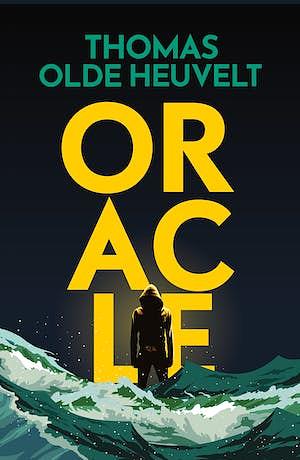In both timelines there was a chain of events triggered by a smaller event on the North Sea. At Doggerland, it was the annual sacrifice they pushed off in a canoe. In the eighteenth century, it was the five sick hands they threw overboard to drown. ‘It’s been awakened,’ Grim uttered. ‘That thing from below. Its hunger was aroused, and now it’s demanding more . . .’ [p. 280]
I've enjoyed Heuvelt's previous novels (HEX and Echo: supernatural horror in the modern world, with layered narrative and unreliable narrators. Oracle -- in which an eighteenth-century plague ship suddenly appears in a tulip field -- ties together Doggerland, oil rigs, smallpox epidemics and oppressive regimes. The protagonists are Luca Wolf, aged thirteen, who watches his best friend Emma vanish into the ship (they're the first to see it) and, later, his father; Robert Grim, who appeared in HEX; Eleanor Delveaux, who heads a shadowy government department tasked with investigating weird phenomena; and Vincent Becker, a damage assessment inspector investigating a disaster at a North Sea oil rig called Mammoth III. This is not the only mammoth we will encounter.
Luca is a delight, as is his practical and open-minded girlfriend Safiya. Grim is rather two-dimensional (I don't really remember him from HEX). So is Eleanor, who was not endeared to me by the explanation '[she] knew she was hated and she didn’t care. In the male-dominated world of power, you had to be hard as nails to stand your ground. If that meant that she was perpetuating the stereotype of the unscrupulous battle axe, then tough'.
The secondary characters, to be honest, are more interesting than most of the protagonists: a tulip-farmer haunted by the sound of a bell, a rig mechanic talking about discovering a gargantuan skull, a Guardian correspondent abducted in broad daylight... Where the novel excels is not in character depth but in visions of ancient rituals and curses, the living memory of catastrophic floods, the terrors of storms at sea: in Elder Gods, half-glimpsed horrors and human bodies metamorphosed into something dreadful. The climax is thoroughly cinematic, though the true resolution of the ancient conflict between humanity and the natural world is described only in the Epilogue.
This was a well-paced read with some evocative locations, nicely interwoven past-and-present, and the occasional echo of Lost. And there are hints that we'll see more of Grim in Heuvelt's future novels.

No comments:
Post a Comment